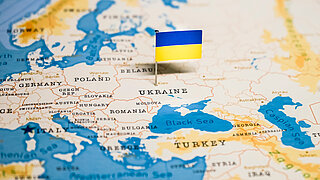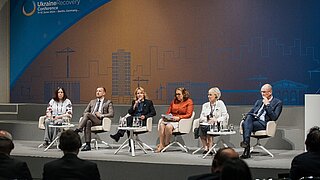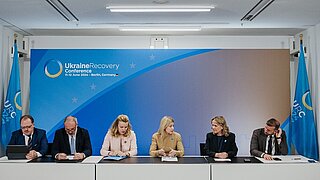The IKI is supporting green recovery in Ukraine

At this year’s Ukraine recovery conference, the International Climate Initiative was present in several capacities.
The German Federal Government is using the funding programme to support the creation of a resilient energy system in Ukraine in particular.
Following the last Ukraine Recovery Conference (URC) in London, German Chancellor Olaf Scholz and Ukrainian President Volodymyr Zelenskyy invited delegates to Berlin for this year’s URC, which was held on 11 and 12 June. Titling the conference ‘United in defence. United in recovery. Stronger together.’, the Federal Government underlined its support for Ukraine as well as its engagement in the recovery process. More than 3,400 delegates were in attendance, including 60 state delegations and international organisations, plus representatives from business, civil society groupings, and Ukrainian regions and municipalities. The International Climate Initiative (IKI) also attended in various capacities.
Federal Minister Habeck: ‘Sending a signal of unity and support to the people of Ukraine’
In light of Russian attacks on the Ukrainian energy infrastructure, the topic of energy was again a focus at the conference. In his keynote, German Minister for Economic Affairs Robert Habeck therefore emphasised the fact that the conference was sending a decisive and unequivocal signal to Russia:
“Germany and its partners are guaranteeing Ukraine their full support in all areas, and working to develop a clear post-war perspective for the country.”
In addition, Habeck also underlined the importance of decentralised renewables for energy security , as a decentralised power supply with solar facilities and wind parks is more resilient to military attacks. To promote decentralised solutions, the German Federal Ministry for Economic Affairs and Climate Action (BMWK) provided the sum of EUR 20 million via the IKI to the European Investment Bank (EIB) last year.
In recent months, Russia has stepped up attacks on the Ukrainian energy sector. This has caused severe problems for the supply of electricity in Ukraine, with power cuts now being a regular occurrence. Alongside repairing damage to infrastructure while maintaining supplies of electricity and heat, long-term plans therefore also include the establishment and expansion of decentralised and green energy supply systems.
The IKI is funding decentralised, green energy
One point of focus for the IKI is promoting exactly this transformation from fossil to decentralised, green energy. Embedded within an ambitious climate policy, this not only contributes to the mitigation of greenhouse gas emissions but also establishes a secure and resilient energy system in Ukraine. The IKI is also working to improve energy efficiency in many projects, so as to lower power requirements and cut greenhouse gas emissions.
Signing of letter of intent to implement the IKI-funded Renewable Energy Solutions Programme

The Ukraine conference was also used to sign a letter of intent between Berthold Goeke, Head of the Climate Action Department at the BMWK, Teresa Czerwińska, Vice President of the European Investment Bank (EIB) and Vasyl Shkurakov, First Deputy Minister for Communities, Territories and Infrastructure Development of Ukraine, to implement the Renewable Energy Solutions (RES) Programme supported by the IKI.
Through the IKI, the BMWK is providing EUR 20 million for the EIB’s RES Programme. The RES Programme aims to promote energy security and the transition to renewable energy sources, including solar energy, as well as decarbonisation measures. Corresponding measures are also being implemented in the war-torn east of Ukraine.
Berthold Goeke: “For the supply of renewable energy, the funding of decentralised solutions makes up an important component of the Federal Government’s support for Ukraine. Via the International Climate Initiative, we are simultaneously contributing to energy supply systems that are both secure and clean. I remain convinced that the topic of climate neutrality can and must be taken into account within all recovery projects. Ukraine is showing remarkable resilience and engagement for the climate and energy transition, despite the military threats it is facing. Together with our many partners, we are standing firm with Ukraine.”
Panel ‘Green Recovery and European Green Deal for Ukraine’

German Federal Environment Minister Steffi Lemke and Minister of Environmental Protection and Natural Resources of Ukraine Ruslan Strilets co-hosted the panel ‘Green Recovery and European Green Deal for Ukraine’. Also taking part in the panel were Virginijus Sinkevičius, European Commissioner for the Environment, Oceans and Fisheries, Margot Wallström, former European Commissioner for the Environment and former Swedish Minister for Foreign Affairs who also co-chairs a high-ranking working group on war-related environmental damage, Mark Bowman, Vice President for Policy and Partnerships at the European Bank for Reconstruction and Development (EBRD), and Nataliya Andrusevych, Head of the Board of the Resource and Analysis Centre ‘Society and Environment’, as a civil-society representative. The panel was also used to announce the launch of the ‘Platform for Action on the Green Recovery’, which will be financed by the IKI.
In her keynote, Lemke emphasised how the war was causing immeasurable human suffering.
“Families are mourning their dead. Children are growing up without a father. People are losing things that they have spent a lifetime building. The war is also causing immense environmental damage. In many places, the drinking water and waste water infrastructure has been effectively destroyed. At the moment, the primary focus is on the safety and health of the Ukrainian people. Basic services – especially drinking water – are most important here. The success of the recovery process will then depend on joined-up thinking for environmental and climate questions together with economic and financing issues from the outset: water supplies, waste disposal, a stable energy system, and a healthy natural environment are key preconditions for the health and safety of people – but also for the competitiveness of the manufacturing sector.”
Launch of the Platform for Action on the Green Recovery

Together with the three international organisations UNEP, OECD and UNECE, a signing ceremony for the joint declaration on the Platform for Action on the Green Recovery was held in Berlin on the afternoon of 11 June 2024. Ukrainian Deputy Prime Minister Olha Stefanishyna, Federal Environment Minister Lemke and European Commissioner for the Environment Sinkevičius took part in the ceremony.
This platform has been set up by the three international organisations, with support from the BMUV, under the aegis of Federal Environment Minister Lemke in cooperation with Ukrainian partners and the EU Commission. The platform aims to support the Ukrainian government in its efforts to anchor environmental protection in the recovery process. Specifically, the platform will help to bring together the necessary economic and ecological expertise during recovery, and address the general conditions required within regulatory and financial practice that will make the green recovery possible. The platform also aims to provide an overview of the needs of Ukraine as well as the various options for support from donors and other organisations.
The BMUV plans to provide the platform with financial support totalling EUR 5 million from IKI funds.
IKI stand at the Recovery Forum

At the Recovery Forum, a total of 60 stands were on hand to present the work of Ukrainian, German and international representatives of companies from sectors such as energy, health, logistics and defence, as well as local government and civil society. The IKI also exhibited at this forum.
The joint stand hosted by the Ukrainian Climate Office, the German-Ukrainian Energy Partnership, the Energy Community Secretariat, the Green Deal Ukraїna project and the IKI, including the H2-diplo team, was very well attended. Conference participants from the private sector, international organisations, civil society and Ukrainian local government were able to discuss potential opportunities for cooperation as part of specific pilot projects in the fields of energy and the environment.
The stand also provided information about the donation campaign organised by the German-Ukrainian Energy Partnership and the IKI’s engagement in Ukraine.
Members of the Energy Partnership, the IKI and the German Federal Foreign Office also attended the ‘Women in Energy Networking Lunch@URC’ on 12 June, which discussed the role of women in energy systems during crisis situations and subsequent recovery, and the kinds of support that are needed in this context.
High-level side event from the Ukrainian Climate Office

A high-ranking side event was also organised during the Ukraine conference by the Ministry of Environmental Protection and Natural Resources of Ukraine and the Ukrainian Climate Office, which is financed by the IKI and the European Union.
At this event, experts from the fields of research and policymaking joined members of various associations to discuss topics such as national policymaking in Ukraine, requirements for EU integration and their associated reform programmes, local challenges, carbon taxation and the emissions trading scheme. Entitled ‘Ukraine’s Climate Dialogue: Policy Developments on the EU Path’, the side event also highlighted the efforts made by the country towards an ambitious climate policy as well as the joint achievements of Germany and the EU in areas relevant for climate.
The keynote was held by Margot Wallström: “The environment is sometimes seen as a luxury, an abstract idea or afterthought, which can be attended to once the war is over. But that’s not the case – the environment is important for human survival and for the Ukrainian economy.”
A panel discussion during the side event, chaired by Iryna Stavchuk from the European Climate Foundation, and former deputy minister and advisor on climate policy, focused on the central role and expertise of civil society actors in the recovery process, in EU integration, and in the design and implementation of approaches to climate change mitigation and biodiversity conservation. Nataliya Andrusevych from the Resource and Analysis Centre ‘Society and Environment’, Valeriia Kolomiiets from WWF Ukraine, Anastasia Drapaliuk from the Nature Protection Fund, Maria Bielkina from Ecoaction and Alexander Davies from the Norwegian Refugee Council presented an impressive case for the challenges that are faced by actors at local level and in the field of civil engagement. They also highlighted the kinds of support that are needed to put civil society in a position where it is capable of contributing to society, the environment and a sustainable recovery. Key agenda items during the discussion included interim results from a study on the perception of climate change in Ukrainian society, particularly while the war is ongoing, as well as cooperative efforts between civil society and government, particularly in fields such as policymaking, the role of forests and their conservation, the dwindling levels of human resources for nature reserves, and the impacts of war and climate on agriculture and soils.
The link has been copied to the clipboard
Contact
IKI Office
Zukunft – Umwelt – Gesellschaft (ZUG) gGmbH
Stresemannstraße 69-71
10963 Berlin
The IKI in Ukraine
The IKI has supported Ukraine as one of its priority countries since 2008. The IKI is currently being used to fund 21 projects in Ukraine, 10 of which are bilateral projects. Two further bilateral projects are currently in planning. In light of the impact of the Russian war of aggression, the IKI is focusing its projects to meet the most pressing demand: the country’s green recovery. Here, the IKI is engaging with topics such as decentralisation, decarbonisation and the flexibilisation of the energy system. In 2023, three projects were launched in the field of decentralised, renewable energy for restoring energy and heat supply systems, with an overall funding volume of approximately EUR 40 million.











![[Translate to English:]](/fileadmin/_processed_/1/9/csm_20231120_eroeffnung_klimabuero_GIZ_Gate_Agency_443014c5e2.jpg)




